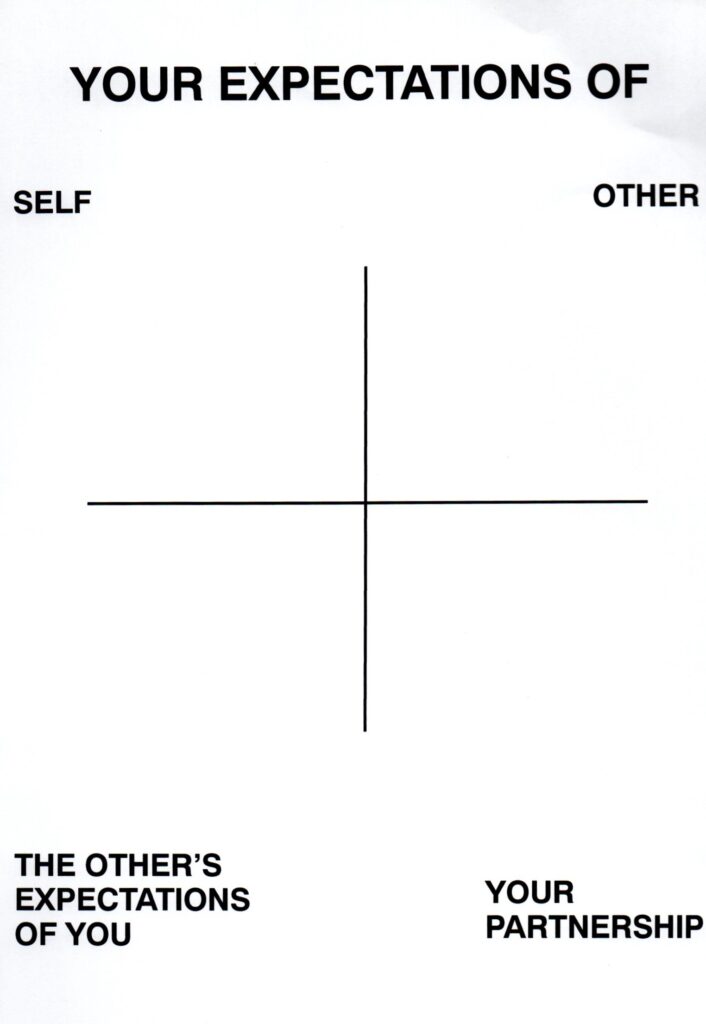Here I will break away from my own general rule. I am going to recommend a specific, safe experiment that most folk could use.
Note: I do not say ‘small’, safe experiment on this occasion. It is not a small experiment; it is rather more difficult than first appears. It seems like I am just asking you to talk with one other person. We’ve all been doing that for a good while now!
However. this experiment asks you to organise your way of talking, one with another, in a very particular way. Hence, the name “Special Time”.
One experiment that is not always so safe: take time to get it right
I am being very instructional on this page; something I avoid for the most part. However, the experiment is so tricky that only very clear instructions can help it along!
There are problems with my approach here: I have a strong wish to help you create the change you want but:
- It is not generally good clinical practice for a therapist to make specific suggestions. It makes me a sitting target. I am not the one having to implement the safe experiment but my approach means I could be open to blame if the ‘instruction’ is faulty!
- I cannot know all the complexities in your relationship. A really good experiment must take account of complexities.
- I prefer small, safe experiments. This one is neither small, nor is it going to be safe for some people, some of the time. If there is a wide gap in your ways of communicating, then small actions may not to create change. Seek conjoint therapy if in any doubt.
- I can imagine that there is some sense of urgency when communications falter. Urgency, speed and trying too hard can have counter-productive results. When three of us act quickly, with too little time to digest things, then one or more of us can suffer the consequences.
So – that said – what can I still say about designing a safe experiment called Special Time?
More on small victories and small defeats
First, you will use Special Time to generate victories and defeats that help us to adapt to one another. I cannot repeat that too much.
- With victories, you will say to one another: how can we build on that?
- With defeats you will talk about: what can we do that is just a little bit different when a similar situation arises very soon.
The small defeats are difficult to tolerate but there is no progress if I do not learn from the things that go wrong. This webpage will produce a defeat for some readers, somewhere.
The aim of Special Time is to:
encourage complementary transactions.
How to do that?
- You are more likely to sustain five or ten minutes’ complementary transactions when you use “I”; the first person, and “now”, the present tense.
- If, within a week, and 2/3 shots at Special Time, there is no evident change in your circumstances then I’d advise you to think again. The experiment may not be for you. You could review your options differently, say, by consulting a therapist. In particular, consider a specialist in couples work. Check out that any therapist being considered has had additional training in systemic work, It will be better for this research to be undertaken by both of you.
- Meet on at least three occasions, for no more than 10 minutes. The time interval is not sacrosanct. It is simply a warning that few of us can concentrate for long when seeking to do things differently. Five minutes may be all that is possible. That time interval is, indeed, one thing that only the two of you can know. Negotiate it and still be flexible.
- Do not clock watch as that will divert your attention, and your energy, from a much more important task. In the same vein, do not make notes at the time – do that afterwards, in a place where you can reflect.
- When you meet, ensure it is at a helpful time of day – not before bed time, or moments before another important appointment, eg. Meal time.
- No alcohol before or during the event. That’s not to say you cannot have a ‘safe’ drink.
- Have a backup plan for taking time out. Agree that both of you can take time out in a safe place without having to go too far. Do not follow your partner if they exercise this choice. Let them be, preferably with a pre-agreed time interval.
Do you have a genuine agreement to do this?
Before you start Special Time, ensure you have ‘informed consent’ from any other party you wish to involve.
‘Informed consent’ means that they have read this material, had time to do their own research and think things through. Also, they will have had some involvement in the practical arrangements for Special Time (say, when and where and for how long) and, crucially, they will have felt consulted about the design of a joint safe experiment.
Confirm each of your own preferred ‘time-out’ places. As stated, agree that either of you can leave without the permission of the other BUT identify an approximate time when normal service is resumed. Agree on this time interval before ‘Special Time’ starts.
Do not start up the special time again immediately after ‘time out’. Set up another event later.
Now to specific ways to talk one with another
- SPEAK ONLY FOR YOURSELF;
- SPEAK IN SHORT MEASURED SENTENCES SO THE OTHER CAN HAVE SPACE TO THINK, THEN SPEAK;
- DO NOT INTERRUPT the other or, indeed, criticise them for ‘breaking’ a time rule. Just notice what you notice.
- SHARE THE AIR SPACE: that is, 50% for each of you – without clock watching.
- WHEN SPEAKING FOR YOURSELF and when feelings are a focus, be wary of ‘defaulting to your beliefs or opinions. Therefore, it’s “I am feeling hurt”, not “you hurt me by doing ……”
- IF YOU WANT TO REFER TO SOMETHING THE OTHER HAS SAID, then paraphrase it as follows: “Am I right in thinking your point is [summarise as briefly as possible, say, in just 3 or 4 words]. I’d like to hear more about that”.
- Do not use ‘why’ questions during Special Time. You may be surprised to find out how, with practise, it can be a superfluous or unhelpful word. Also, there are few answers to ‘why’ in your present situation. If they do exist, they are likely to be buried in the past. Special Time is not a time for a lot of reflecting on the past – your past, or the other person’s past. See my inverted tree for more on this.
- INSTEAD: consider things like “tell me more …”; how come did that arise…. “, “Thanks you for telling me that… “ “I am curious to know more about ….”. Note the “I” is first person and the “am” is present tense”. Could you see a way to put that “did” into the present tense?
ANOTHER AIM OF SPECIAL TIME IS TO IMPROVE YOUR ABILITY TO HEAR ANOTHER HUMAN BEING
…. not to judge them, or given them the benefit of your experience and views.
Indeed, afterward, you might like to rate your listening skills on a 1 to 10 scale: where 1 = is not at all good, and 9 = is really good. At that point, look for evidence that backs up your assessment of yourself.
Do not assess the other.
You will not remember each and every rule I am laying down here. Indeed, trying to implement each and every rule is most likely to fail. Be accepting of how your best effort is implemented.
You are vulnerable to criticism from yourself – and the other person – for “getting it wrong”. It can even bring about it’s own argument.
DO NOT COMMENT ON THE OTHER’S SKILLS AT THE TIME. Indeed, that might even include complements about their skills. This can slip into ‘patronising’.
In my experience, one of the problems that most couples will meet at some time is the loss of common purpose. What are we doing together, and what are we setting out to achieve and why bother. When we set out, mother nature has her own way of over-riding these questions with the permitted temporary psychosis called ‘falling in love’.
In time, her impulses or drives lessen. The smarter and younger sibling has a task on hand at that point as two of them have to reach some other kind of understanding about what tomorrow will bring.
ANOTHER EXPERIMENT
Take a look at this work-sheet.

If your partner is willing, each take a copy to a corner and complete it privately.
DO NOT consult on it, or work on it together at this time.
Use bullet-points to record your position within this current relationship. Reflect on:
What do you expect, yourself, to bring to it?
What do you expect, of your partner (other), in your relationship?
What do you believe your partner expect of you?
What do you expect of the relationship itself?
After an agreed amount of time, come together and review the results for an agreed period of time. Do not require yourselves to ‘sort it’ there and then. Come back to it, if necessary.
Work out a running order so there is sharing of the information, bit by bit, and one at a time. Agree that one person will not take too much of the time available yet find ways to avoid interrupting your partner and/or being offended by any particular piece of information.
Include a second experiment by using all those communications skills listed above.
I predict you will surprise yourself and your partner some where along the way. The experiment is likely to provide much material for future experiments.
Be careful with one another.
So there it is. Let me know how it works out. Let me know what adaptations you devised to help Special Time work for you.
Here is a Feedback sheet:
Return to:
What helps safe experiments along
